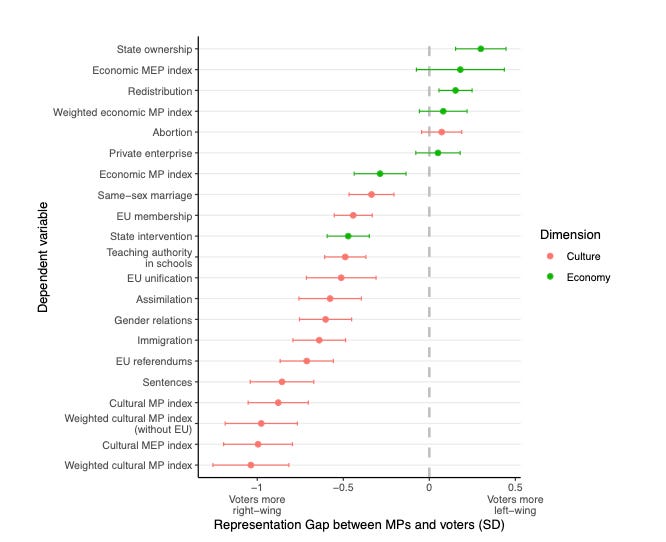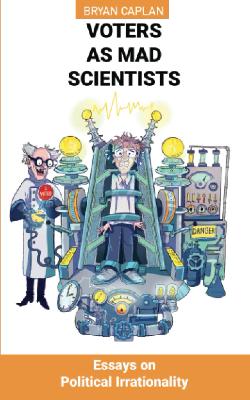Discover CSPI Podcast
CSPI Podcast

CSPI Podcast
Author: CSPI
Subscribed: 122Played: 4,696Subscribe
Share
© CSPI
Description
Discussions with CSPI scholars and leading thinkers in science, technology, and politics.
www.cspicenter.com
www.cspicenter.com
73 Episodes
Reverse
Jesse Arm (X, Substack) is the Vice President of External Affairs at the Manhattan Institute. He joins the podcast to talk about his recent article, “Ezra Klein’s Blindspot.” Along with Richard Hanania, he discusses whether there really is a pro-abundance future for the Democrats. The conversation involves a comparison of the two parties, and a debate over what is happening on both sides of the political spectrum. Hanania mentions self-driving cars as a perfect experiment to test which side is more likely to embrace progress, and thus far it has been red states that have been more open to the technology. Hanania and Arm disagree strongly about JD Vance, and what he says about the future of the GOP. Recently, Rod Dreher made waves by suggesting that perhaps 30% to 40% of Republican staffers are Groypers. As Arm’s job involves dealing with this class of people, he has particular insight into that issue. Hanania is interested in not only whether they are personally fans of Nick Fuentes, but also what their views are about Ronald Reagan and how they think about political issues more generally.Arm also explains the dynamics of the recent NYC mayoral race. How did Mamdani end up winning? And why couldn’t the Republicans field a serious challenger? The conversation provides much to consider for those who believe that embracing markets and new technology is the best way to achieve economic growth but feel alienated from both major parties right now. Arm and Hanania also handicap the 2028 Democratic race, discussing how Alexandria Ocasio-Cortez might rise to the top due to the moderate wing being split, in the same way that Biden had a lane open to him in 2020. For more articles by Arm and other Manhattan Institute scholars, subscribe to the City Journal Substack. Related LinksJesse Arm, “Ezra Klein’s Blindspot”Richard Hanania, “The Broad Lessons of YIMBY”Richard Hanania, “Boomer Liberalism Must Be Overcome” (conversation with Derek Thompson)Richard Hanania interviews State Senator Scott Weiner on the YIMBY victory in CaliforniaTimothy B. Lee and Kai Williams, “Waymo’s Next Five Cities Are All in Red States”JD Vance on the problems of Appalachia Get full access to Center for the Study of Partisanship and Ideology at www.cspicenter.com/subscribe
Laurenz Guenther (X, website) is a Research Fellow at the Toulouse School of Economics. He joins the podcast to discuss his working paper, “Political Representation Gaps and Populism.” Relying on survey data of politicians and regular citizens across the EU, he finds a simple explanation for the rise of populism across the continent. Politicians are one standard deviation to the left of the public on social issues. As Guenther points out, the gap is larger than the difference between the typical communist and conservative MP. Immigrants are more conservative on migration and assimilation issues than politicians. These are quite remarkable findings, and must be factored into any understanding of contemporary European politics. Beginning in the 2010s, the salience of the immigration issue took off. Voters have been flocking to populist candidates as a result ever since. As much as many academics and political leaders would like to deny this fact, this provides the most straightforward explanation for recent trends. The conversation focuses on what to make of the data. Does this mean that to defeat populism, all politicians have to do is become more restrictionist? How does this square with the rise of populism being a global phenomenon, even in countries where immigration isn’t an issue? What to make of research showing that populism is bad for the economy? Are there examples of European parties that have headed off the rise of populism in this way? Guenther discusses the well-known case of Denmark, but also brings up the surprising example of Hungary, where Orbán took the mainstream conservative party, made it more populist, and has dominated the politics of his nation ever since.Another perhaps surprising finding is that there is much less of an elite-public gap on economic issues. If anything, politicians are more inclined to support free markets. Hanania asks whether the gap might be even greater than the paper suggests, given the way questions are framed. This helps explain why left-wing populism hasn’t been as successful as its right-wing equivalent, whether in the US or Europe. Abortion pops up as the one social issue on which there is no notable difference between elites and the public. This is reminiscent of experiences in American red states, where politicians take abortion rights away while voters nearly everywhere support the pro-choice position in referendums. The conversation discusses why this might be.The rise of right-wing populism is the political story of our time. By grounding the discussion in empirical data, Guenther sheds light on why mainstream parties have struggled to respond, and what strategies may or may not work to blunt the populist surge. This conversation helps provide a clear and evidence-based perspective on one of the defining issues of our era, while providing hints of possible future productive avenues of research. Get full access to Center for the Study of Partisanship and Ideology at www.cspicenter.com/subscribe
Philip Wallach (follow on X) is a senior fellow at the American Enterprise Institute and the author of the book Why Congress, which he joins Richard Hanania to discuss. In this conversation, Hanania and Wallach review the historical role of Congress in American politics, focusing on key events from the FDR administration to the present. Wallach explains the important role Congress played in making sure that Roosevelt did not take the country too far down the path of economic statism, a history that Hanania points out is in tension with some of the ideas of Curtis Yarvin. Throughout the conversation, Wallach emphasizes the importance of Congress in shaping policy and maintaining a balance of power between the branches of government. They explore the impact of significant legislation, the dynamics of the Civil Rights Movement, and changes in Congressional structure during the 1970s. The discussion also touches on the influence of Newt Gingrich, the ongoing challenges of governance in a polarized political environment, the impact of Trump, and the potential for bipartisan cooperation on policy issues. Wallach argues for a more responsive Congress that can find compromises between political factions and effectively address the concerns of the American public.Hanania plays devil’s advocate, and asks whether it might be better for Congress not to legislate, using European states and the EU as a comparison. Near the end, Hanania asks who the best people are to follow in order to stay informed about Congress. You can find Wallach’s preferred list here. Get full access to Center for the Study of Partisanship and Ideology at www.cspicenter.com/subscribe
Stephen Goldstein (follow on X) is a postdoc in Evolutionary Virology at the University of Utah School of Medicine, where he specializes in coronaviruses. In this interview, he addresses common misconceptions about vaccines, particularly the debunked link to autism, and emphasizes the rigorous safety testing that vaccines undergo. The conversation also explores the reactions to COVID-19 vaccines, and the challenges of communicating credible information to the public. Goldstein highlights the need for innovative methods to improve public acceptance and accessibility. He discusses the potential of certain vaccines, such as that against HPV, to save millions of lives and address the long-term effects of diseases like measles; the search for vaccines against viruses like Epstein-Barr; and the balance between safety and innovation in development. One thing that is highlighted in this conversation is the problem with the “just taking questions” posture adopted by the anti-vaxx movement. Most of the questions they ask have been answered. Those that remain do not create enough doubt to suggest a person should not get the vaccines recommended by public health professionals. For more along these lines, see Richard Hanania, “Vaccines and the Tightrope of Progress.” This interview originally appeared here. Get full access to Center for the Study of Partisanship and Ideology at www.cspicenter.com/subscribe
Eric Kaufmann is a research fellow at CSPI and a professor of politics at the University of Buckingham. He joins the podcast to talk about his new book, Taboo: How Making Race Sacred Produced a Cultural Revolution. Eric explains its thesis, which holds that the taboos around race that arose in the 1960s expanded into other areas of life and eventually led to modern wokeness. He and Richard debate the plausibility of this idea, its similarities and differences with those put forth in The Origins of Woke, and what kind of policy responses might be appropriate to stem and ultimately reverse undesirable cultural trends. The conversation ends with some discussion about free speech in academia, and why Eric decided to leave his old university and start teaching at the University of Buckingham. Get full access to Center for the Study of Partisanship and Ideology at www.cspicenter.com/subscribe
Bess Stillman (email) is a doctor at the Mayo Clinic and writes at Everything Is An Emergency. She is also an excellent storyteller who uses her skills to convey the hectic and at times heart wrenching experiences one faces as an ER doctor. Bess is married to Jake Seliger, who in 2022 was diagnosed with squamous cell carcinoma. She has written a three-part series about the struggles that she and Jake have faced getting him into clinical trials. On the podcast, Bess describes the maddening and cruelly irrational processes that dying patients must go through in order to find access to treatments that might help them. The conversation covers the nightmare of dealing with ClinicalTrials.gov, the requirement that an individual travel across state lines to even know if they are eligible for a trial, and how the government continues to exercise paternalism on the behalf of patients who have no other options other than to take a drug that has not yet been proven to work. Bess also discusses policy ideas she would like to see implemented, and finally shares some stories from her time as an ER doctor.The themes touched on here will be familiar to those who have read about the “invisible graveyard” that the FDA is responsible for. Yet even listeners who know about the utter lack of interest in patient well being normally shown by federal agencies will find themselves shocked by the degree to which bureaucratic procedures with few plausible benefits govern the lives of sick individuals who want nothing but to get some extra time on this earth and help move science forward. For dealing with the clinical trial system in its current state, Bess is currently trying to figure out ways to assist oncologists and patients in being able to navigate the process at HelpMeFindAClinicalTrial.com. And hopefully by telling her story, she can help inspire much needed reforms to the system. Get full access to Center for the Study of Partisanship and Ideology at www.cspicenter.com/subscribe
Rob Henderson joins the podcast to talk about his book Troubled: A Memoir of Foster Care, Family, and Social Class. The conversation starts with a discussion about the recent controversy in which Rob was unable to find a book store that would host his launch. Rob also shares insights into his writing style, which focuses on conveying his experiences in a matter-of-fact way rather than dwelling on his internal emotional state. Richard then questions him about the story of his biological parents, and whether he would ever want to reconnect with them, particularly the Korean grandfather who started out as a police detective and then struck it rich as the owner of a fertilizer company. The two go on to discuss other aspects of Rob’s life story, including what the friends he grew up with think of his success, what it was like in the military, including stints in Qatar and Kyrgyzstan, and when he began questioning elite narratives surrounding issues like the importance of family stability and personal responsibility. Finally, Rob talks about what is next for him now that the book promotion tour is winding down. Get full access to Center for the Study of Partisanship and Ideology at www.cspicenter.com/subscribe
Romina Boccia is the director of budget and entitlement policy at the Cato Institute, where she writes about government spending, the debt problem, and entitlement reform. She also has a Substack called the Debt Dispatch that you can subscribe to here. Romina joins the podcast to discuss available paths to deal with the coming entitlement crisis. One potential way to get politicians out of making tough choices is to create a debt commission that takes responsibility for unpopular reforms. Romina has written about using the model of the BRAC commission, which was relied on to close down military bases at the end of the Cold War.The conversation also touches on the politics of debt, how policymakers are thinking about these issues, Paul Ryan as an unappreciated hero of our time, and much more. Near the end, Romina reflects on her career as a DC policy-wonk, and why she is motivated to help ensure that America continues to be the land of opportunity. If we don’t get entitlements under control, it could potentially degrade our entire way of life. For more discussion on this topic and the difficult choices our leaders will soon be facing, see the previous CSPI podcast with Brian Riedl. Listen to the podcast with Romina here or watch the video on YouTube. Get full access to Center for the Study of Partisanship and Ideology at www.cspicenter.com/subscribe
Brian Chau writes and hosts a podcast at the From the New World Substack, and recently established a new think tank, the Alliance for the Future.He joins the podcast to discuss why he’s not worried about the alignment problem, where he disagrees with “doomers,” the accomplishments of ChatGPT versus DALL-E, the dangers of regulating AI until progress comes to a halt in the way it did with nuclear power, and more. With his background in computer science, Brian takes issue with many of those who write on this topic, arguing that they think in terms of flawed analogies and know little about the underlying technology. The conversation touches on a previous CSPI discussion with Leopold Aschenbrenner, and the value of continuing to work on alignment. Brian’s view is that AI doomers are making people needlessly pessimistic. He believes that this technology has the potential to do great things for humanity, particularly when it comes to areas like software development and biotech. But the post-World War II era has seen many examples of government hindering progress, and AFF is dedicated to stopping that from happening with artificial intelligence. Listen to the conversation here, or watch the video here. LinksDonate to AFFAFF manifestoBrian on diminishing returns to machine learning, and discussing AI with Marc AndreessenVaswani et al. on transformersLimits of current machine learning techniques Get full access to Center for the Study of Partisanship and Ideology at www.cspicenter.com/subscribe
Andrew Roberts (website, follow on X) is a historian, Visiting Research Fellow at the Hoover Institution at Stanford University, and a member of the House of Lords. He joins the podcast to talk about his Napoleon: A Life. The conversation begins with a discussion of different counterfactuals regarding ways in which Napoleon might have been able to stay in power, which leads to Roberts explaining his view that the wars of the era could be understood at least in part as resulting from a rejection of free trade. Other topics include:* Meritocracy as a guiding principle of the French Revolution and a justification for Napoleon’s regime* Napoleon’s personal magnetism and why men were willing to follow him* The relationship with Josephine, and whether or not it influenced any of his political decision* Whether Napoleon was in fact the greatest general of his timeSee also Hanania’s audio review of the Ridley Scott film, and Roberts’ reviews in Commentary and The Times. For an edited transcript of this conversation, see here. Get full access to Center for the Study of Partisanship and Ideology at www.cspicenter.com/subscribe
Brian Riedl is a senior fellow at the Manhattan Institute, focusing on budget, tax, and economic policy. His previous jobs include chief economist to Senator Rob Portman (R-OH), and positions on the Marco Rubio and Mitt Romney presidential campaigns. He joins the podcast to talk about the financial future of the United States, with a special focus on entitlements. Medicare is projected to run out by 2031, and Social Security only two years later. Because of politicians kicking the can down the road for so long, this will mean that the federal government will at that point have to either implement massive benefit cuts for seniors or significantly raise taxes across the board.Brian talks about his experience in Washington, the history of negotiations over the debt, and what politicians say when you bring up these facts. We appear to be in an undesirable equilibrium, where everyone’s incentive is to ignore the issues involved, while the status quo is leading us towards disaster. Despite liberals wanting to tax the rich and conservatives calling for a cut to foreign aid and non-entitlement forms of domestic spending, the numbers for such proposals don’t add up. We will either get entitlement spending under control, or become taxed at the level of Europeans.In one important way, we will actually be worse off than Europe, because their welfare states pay for services and benefits that go to families across a wide section of the population. We are potentially building a US welfare state that will have high taxes primarily to funnel money to the elderly. The fact that older Americans are richer than those who will be supporting them makes the future we are moving towards even more absurd. LinksBrian Riedl: chart book on spending, report on the limits of taxing the rich, CNN op-ed on interest rates, NYT op-ed on Biden’s promises on entitlementsBrian’s X page, Manhattan Institute website Get full access to Center for the Study of Partisanship and Ideology at www.cspicenter.com/subscribe
Niklas Anzinger is the founder and General Partner of Infinita, the first Próspera-based VC fund, which invests in founders overcoming regulatory capture in crypto, biotech and hardware through network states and startup cities. He’s also one of the 100 or so residents of Próspera.This was quite an optimistic conversation. The title of the podcast comes from the last thing Niklas said, which was that you don’t actually need attention or to talk about grand projects, but just to show the world what you can do. Niklas is part of the charter city movement, which seeks to build hubs of innovation and progress while bringing the rule of law and economic development to poorer regions of the world. In this eventful conversation, Richard and Niklas touch on* The mechanics of governance in Próspera* Getting around red tape and becoming a hub of medical innovation* Amenities and quality of life in the city* Upcoming conferences and eventsDespite a new government in Honduras that is hostile to charter cities, Niklas is optimistic that they will be able to continue operating. He and Richard also talk about potential medical breakthroughs that Próspera might help bring about, like bacteria that remove cavities from your mouth, and a currently available gene therapy that may make your muscles and bones stronger.LinksNiklas on X, his Substack, RSS for his podcastThe Ultimate Guide to PrósperaAlex Ugorji on XPróspera websiteCiudad MorazánInfinita ManifestoScott Alexander on Próspera, Part I and Part IIMark Lutter on the CSPI podcastMarc Andreessen, The Techno-Optimist ManifestoDocumentary on medical tourism in Próspera; DW report, with appearance from NiklasUpcoming EventsNov 3-5: Crypto Futurism & Legal Engineering 2023 - A Próspera Builders’ SummitNov 17-19: DeSci & Longevity Biotech 2023 - A Próspera Builders' Summit Jan 6-Mar 1: Vitalia - Starting the Frontier City of Life Get full access to Center for the Study of Partisanship and Ideology at www.cspicenter.com/subscribe
Chris Rufo joins the podcast to talk about his new book, America's Cultural Revolution: How the Radical Left Conquered Everything.Rufo begins by talking about his background and his theory of political change. The conversation then shifts to his new book, the strengths of Ron DeSantis as an administrator, and finally what he’s doing on the board of the New College of Florida. Topics include:* Where did all of the crazy ideas that seem to have taken over institutions in the last few years come from? * What took conservatives so long to wake up to the problem?* Did Rufo end up liking the intellectuals he was studying?* What are the connections between left-wing ideas and civil rights law?* How do conservatives reach “good liberals” within institutions?See the transcript of the conversation at the Richard Hanania Newsletter.Listen in podcast form or watch the conversation on YouTube.Links:* Richard Hanania, The DeSantis Revolution* Politico profile on the relationship between Rufo and DeSantis* Rufo, America's Cultural Revolution: How the Radical Left Conquered Everything.* Rufo video on the trans movement and “nullification” surgery, discusses his theory of political change* Hanania, The Origins of Woke (forthcoming book)* Robert Rector on black-white gaps* The Atlantic giving Rufo his due Get full access to Center for the Study of Partisanship and Ideology at www.cspicenter.com/subscribe
In the popular imagination, the AI alignment debate is between those who say everything is hopeless, and others who tell us there is nothing to worry about.Leopold Aschenbrenner graduated valedictorian from Columbia in 2021 when he was 19 years old. He is currently a research affiliate at the Global Priorities Institute at Oxford, and previously helped run Future Fund, which works on philanthropy in AI and biosecurity. He contends that, contrary to popular perceptions, there aren’t that many people working on the alignment issue. Not only that, but he argues that the problem is actually solvable. In this podcast, he discusses what he believes some of the most promising paths forward are. Even if there is only a small probability that AI is dangerous, a small chance of existential risk is something to take seriously.AI is not all potential downsides. Near the end, the discussion turns to the possibility that it may supercharge a new era of economic growth. Aschebrenner and Hanania discuss fundamental questions of how well GDP numbers still capture what we want to measure, the possibility that regulation strangles AI to death, and whether the changes we see in the coming decades will be on the same scale as the internet or more important. Listen in podcast form here, or watch on YouTube.Links:* Leopold Aschenbrenner, “Nobody’s on the Ball on AGI Alignment.” * Collin Burns, Haotian Ye, Dan Klein, and Jacob Steinhardt, “Discovering Latent Knowledge in Language Models Without Supervision.” * Kevin Meng, David Bau, Alex Andonian, and Yonatan Belinkov, “Locating and Editing Factual Associations in GPT.”* Leopold’s Tweets: * Using GPT4 to interpret GPT2 .* What a model says is not necessarily what’s it’s“thinking” internally. Get full access to Center for the Study of Partisanship and Ideology at www.cspicenter.com/subscribe
Bryan Caplan joins the podcast to talk about his new book, Voters as Mad Scientists: Essays on Political Irrationality.Bryan begins by explaining why he hates politics. Much of the conversation then centers around Caplan’s simplistic theory of the right and left. This is compared and contrasted with Scott Alexander’s thrive/survive theory of the political spectrum, Robin Hanson’s theory of farmers and foragers, and Hanania’s “Liberals Read, Conservatives Watch TV.”Near the end, the discussion turns to the political climate at GMU, and whether the intellectual community that has been built can survive the trend towards DEI. Caplan emphasizes that he has noticed a difference since Glenn Youngkin came to power in Virginia, showing that politics actually matters for determining the future of free speech and intellectual freedom.For previous Bryan appearances on the podcast, see: May 2021, September 2022, and May 2022.Listen in podcast form or watch on YouTube. Get full access to Center for the Study of Partisanship and Ideology at www.cspicenter.com/subscribe
This week we’re rereleasing a previous episode with Marc Andreessen, originally released on August 16, 2021. He is co-founder and general partner of Andreessen Horowitz. Earlier in life, he was the co-founder of Opsware, Ning, and Netscape. Marc joins the podcast to talk about what’s gone wrong with science, the prerequisites for progress, and how tech has changed our lives and has the potential to disrupt stagnant institutions. Topics also include how the internet has influenced dating, what venture capitalists actually do, and whether there is too much – or too little – money in politics.For a transcript of the conversation, see here. Get full access to Center for the Study of Partisanship and Ideology at www.cspicenter.com/subscribe
Robin Hanson joins the podcast to talk about the AI debate. He explains his reasons for being skeptical about “foom,” or the idea that there will emerge a sudden superintelligence that will be able to improve itself quickly and potentially destroy humanity in the service of its goals. Among his arguments are:* We should start with a very low prior about something like this happening, given the history of the world. We already have “superintelligences” in the form of firms, for example, and they only improve slowly and incrementally * There are different levels of abstraction with regards to intelligence and knowledge. A machine that can reason very fast may not have the specific knowledge necessary to know how to do important things.* We may be erring in thinking of intelligence as a general quality, rather than as more domain-specific.Hanania presents various arguments made by AI doomers, and Hanson responds to each in kind, eventually giving a less than 1% chance that something like the scenario imagined by Eliezer Yudkowsky and others will come to pass. He also discusses why he thinks it is a waste of time to worry about the control problem before we know what any supposed superintelligence will even look like. The conversation includes a discussion about why so many smart people seem drawn to AI doomerism, and why you shouldn’t worry all that much about the principal-agent problem in this area.Listen in podcast form or watch on YouTube. You can also read a transcript of the conversation here.Links:* The Hanson-Yudkowsky AI-Foom Debate* Previous Hanson appearance on CSPI podcast, audio and transcript* Eric Drexler, Engines of Creation* Eric Drexler, Nanosystems* Robin Hanson, “Explain the Sacred”* Robin Hanson, “We See the Sacred from Afar, to See It the Same.”* Articles by Robin on AI alignment:* “Prefer Law to Values” (October 10, 2009)* “The Betterness Explosion” (June 21, 2011)* “Foom Debate, Again” (February 8, 2013)* “How Lumpy AI Services?” (February 14, 2019)* “Agency Failure AI Apocalypse?” (April 10, 2019)* “Foom Update” (May 6, 2022)* “Why Not Wait?” (June 30, 2022) Get full access to Center for the Study of Partisanship and Ideology at www.cspicenter.com/subscribe
Nicholas Bagley is a professor of law at the University of Michigan, former Chief Legal Counsel to Governor Gretchen Whitmer, and a former attorney in the US Department of Justice. He joins the podcast to talk about his article, “The Procedure Fetish,” in which he calls for liberals to embrace reforms to make federal government agencies less sclerotic and more capable of addressing social problems. Richard presents Bagley with questions surrounding issues such as why we should trust government agencies with more power, the role of cost-benefit analysis, the performance of the FDA during Covid-19, and civil service reform, including President Trump’s executive order that would have made it easier to fire more officials. The two discuss whether there can be a synthesis between the right and left on major issues surrounding government regulation.Listen to the podcast here, or watch on YouTube.Links: * Nicholas Bagley, “The Procedure Fetish”* Bagley on The Ezra Klein Show* Bagley on Twitter* Michael Lewis, The Fifth Risk* Matt Yglesias on Operation Warp Speed and the blowback to it* Cass Sunstein on the role of OIRA* Derek Thompson, “The Abundance Agenda” Get full access to Center for the Study of Partisanship and Ideology at www.cspicenter.com/subscribe
Tim Miller is a former political operative who has worked for Jeb Bush and John Huntsman, and is currently a writer for The Bulwark and an MSNBC analyst. He joins the podcast to talk about his political memoir, Why We Did It: A Travelogue from the Republican Road to Hell. With a former insider’s perspective, Miller discusses* Where the Republican Party went wrong* The importance of character in politics* Mistakes made by Clinton and George W. Bush that led us to this point* To what extent right-wing populists have legitimate grievances* The effect of the changing media environment on our fractious politics* Why only Chris Christie could have derailed Trump in 2016* Whether, to stop Trump, other candidates should get out of the way and support DeSantisThe discussion closes on whether there are reasons to be hopeful about the future of the Republican Party. Listen here or watch the video on YouTube. Get full access to Center for the Study of Partisanship and Ideology at www.cspicenter.com/subscribe
Jobst Landgrebe is a German scientist and entrepreneur. He began his career as a Fellow at the Max Planck Institute of Psychiatry, then moved on to become a Senior Research Fellow at the University of Göttingen, working in cell biology and biomathematics. In April 2013, he founded Cognotekt, an AI based language technology company.Barry Smith is Professor of Philosophy at the University at Buffalo, with joint appointments in the Departments of Biomedical Informatics, Neurology, and Computer Science and Engineering. He is also Director of the National Center for Ontological Research and Visiting Professor in the Università della Svizzera italiana (USI) in Lugano, Switzerland. Landgrebe and Smith join the podcast to talk about their book Why Machines Will Never Rule the World: Artificial Intelligence without Fear. As the title indicates, the authors are skeptical towards claims made by Nick Bostrom, Elon Musk, and others about a coming superintelligence that will be able to dominate humanity. Landgrebe and Smith do not only think that such an outcome is beyond our current levels of technology, but that it is for all practical purposes impossible. Among the topics discussed are* The limits of mathematical modeling* The relevance of chaos theory* Our tendency to overestimate human intelligence and underestimate the power of evolution* Why the authors don’t believe that the achievements of Deep Mind, DALL-E, and ChatGPT indicate that general intelligence is imminent * Where Langrebe and Smith think that believers in the Singularity go wrong. Listen in podcast form or watch on YouTube.Links:* The Feynman Lectures on Physics* Landgrebe on Galactica and ChatGPT.* Rodney Brooks, “Intelligence without Representation.”* Nick Bostrom, Superintelligence. Get full access to Center for the Study of Partisanship and Ideology at www.cspicenter.com/subscribe
























